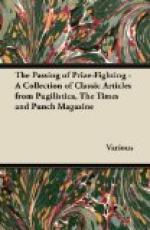If Mr. HAROLD LAKE’S account of the British forces in Macedonia is supposed to supply an answer to a not unnatural query as to what they are doing there, I am afraid one must take it that in fact they are doing nothing in particular. An intelligent British public believes that at least they are immobilising important enemy forces and perhaps accomplishing several other useful things as well, but the writer, who has actually been In Salonica with Our Army (MELROSE), frankly lays aside high considerations of policy and, seeing it all in desperately foreshortened perspective, knows only that he and his fellows, having volunteered to fight, are being called on instead to endure a purgatorial routine of dust and dulness, mosquitoes, malaria and night marches, and the grilling away of useless days in the society of flies and lizards, with only, as a very occasional treat, the smallest glimpse of anything resembling a Front. And all this is in a country so desolated by centuries of war that in spite of obvious natural fertility it is a sullen treeless desert—a desert of blight and thistles, as profitless to our men as their periodically deferred anticipations of a grand advance. A book that sets out to record vacuity can hardly be crammed with thrilling literature, and I am not going to pretend that Mr. LAKE has achieved the impossible. All the same one found points—for instance, his desire that someone (apparently England for choice!) should colonise Macedonia; and his most right and appropriate plea for fairer recognition of those who have sacrificed their health in the national service. A man, he holds, who is to suffer all his life from malarial fever has done his bit no less than plenty who bear the honourable insignia of the wounded in battle and the snout of a mosquito may be as valorously encountered as the bayonet of a Hun. And so say all of us.
* * * * *
I can read Miss MARY WEBB’S studies of the peasant mind with great pleasure, but at the same time I am doubtful whether she is as successful in Gone to Earth (CONSTABLE) as she was in her first novel, The Golden Arrow. My difficulty—and I hope it will not be yours—was to believe in the power of Hazel Woodus to make very dissimilar men lose their hearts and heads. That Jack Reddin, a dare-devil farmer with love for any sort of a chase in his blood, should pursue her to the bitter end is intelligible enough, but why Edward Marston, a rather anaemic minister, married her and then forgave her escapades with Reddin has me bothered. I can admire Edward’s forgiving spirit, but cannot altogether pity him when his methodical congregation said straight and disagreeable things. In fact my total inability to see Hazel as Edward saw her somewhat detracted from my enjoyment of her history. That being said the rest is, thank goodness, praise. Miss WEBB is a careful and sincere workman, who, whether you believe or disbelieve in her characters, writes with such real compassion for suffering that she cannot fail to enlist your sympathy. Additionally her vein is original, and she only needs a little more experience to make a great success of it.




